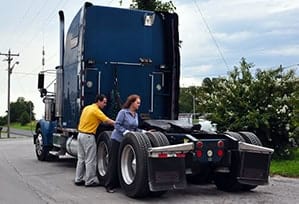 Being involved in a truck accident in Kentucky can be a life changing experience. Due to their size and weight, collisions with commercial trucks can often lead to serious injuries and extensive damage to your vehicle. If you have been involved in a Kentucky truck accident, contact the team at Flora Templeton Stuart Accident Injury Lawyers right away.
Being involved in a truck accident in Kentucky can be a life changing experience. Due to their size and weight, collisions with commercial trucks can often lead to serious injuries and extensive damage to your vehicle. If you have been involved in a Kentucky truck accident, contact the team at Flora Templeton Stuart Accident Injury Lawyers right away.
Truck accidents are vastly different from passenger car wrecks in many ways, and trucking companies are quick and aggressive when it comes to hiding evidence and trying to settle your claim for less than you deserve.
To protect yourself, there are many laws that you should know when you the victim of a big rig accident.
How to Obtain the Police Report in a Kentucky Truck Crash
The first thing you should do if you were hit by a big rig is seek medical attention for your injuries. If you are in a position to do so, you should also report the collision to the appropriate law enforcement agency immediately.
K.R.S. § 189.635 requires that anyone who is involved in a collision in Kentucky “resulting in a fatal or nonfatal personal injury to any person or damage to the vehicle rendering it inoperable” shall be required to immediately notify law enforcement officer having jurisdiction. Depending on the location of where your collision occurred, the agency having jurisdiction will be either Kentucky State Police, the local sheriff’s department, or local city police department.
Kentucky law further requires that any person involved in a collision where there is property damage exceeding $500, in which an investigation is not conducted by a law enforcement officer, shall file a written report of the accident with the department of Kentucky State Police within ten (10) days of the accident.
Kentucky law dictates that the investigating police agency shall file a report of the accident with the Kentucky State Police within ten (10) days after the investigation.
It is important to obtain a copy of your police report as soon as possible. You can find out more about obtaining Kentucky police reports.
You should also gather any insurance or liability information you do not yet have. At Flora Templeton Stuart Accident Injury Lawyers, we promptly complete this process for you and also get investigators and reconstructionists involved if necessary. This is important as trucking companies may attempt to get rid of crucial evidence in your case if you do not move quickly to preserve it.
What Laws Govern Kentucky Truck Accidents?
Commercial trucks, also known as ‘semis’ or ‘big rigs’, are governed by both Federal Statutes and Kentucky Law depending on various factors, such as whether the trucking company operates only within the state (also known as ‘intrastate‘), or out of state (also known as ‘interstate‘). Trucks that operate across state lines are subject to the federal regulations.
The Federal Motor Carrier Safety Administration was established by the United States Department of Transportation and regulates interstate trucking with a primary mission to “prevent commercial motor vehicle-related fatalities and injuries.” Kentucky has also adopted portions of the Federal Motor Carrier Safety Regulations through 601 KAR1:005.
The Federal Motor Carrier Safety Administration regulates many aspects of the trucking industry in an effort to make highway travel safer. This includes regulation of:
- Mandatory minimum liability insurance requirements
- Hours of services for truck drivers
- Training of truck drivers
- Vehicle and load inspection
- Prohibiting driver use of drugs and alcohol
- Maximum weight and load sizes
- Safe transportation of hazardous materials
Other Kentucky Commercial Trucking Laws
Motor Carrier Laws
Kentucky Revised Statutes Chapter 138 deals with “Motor Carriers.” Kentucky defines a motor carrier as “any commercial truck or commercial tractor-trailer combination having a total of two (2) or more axels and a declared gross weight above twenty-six thousand (26,000) pounds.”
Kentucky has different requirements for commercial drivers depending on the weight of the vehicle. For instance:
- If the vehicles gross vehicle weight rating (GVWR) weighs less than 10,001 pounds, a USDOT number is not required.
- If the vehicle GVWR weighs 10,001-26,000 pounds, a USDOT number is required.
- If the vehicle weight is greater than 26,000 pounds, a USDOT number is required.
Commercial Driver’s License (CDL) Laws
Kentucky State Police have also issued a Commercial Driver License Manual for the State of Kentucky, which provides important information on CDL’s and various testing requirements necessary to obtain a CDL. This manual addresses the types of CDL license that are required to operate certain classes of vehicles in Kentucky.
Those classifications are:
Class A CDL
- Any combination of vehicles with a GCWR of 26,001 pounds or more, provided the GVWR of the vehicle(s) being towed is in excess of 10,000 pounds
Class B CDL
- Any single vehicle with a GVWR of 26,0001 pounds or more
- Any vehicle with a GVWR of 26,001 pounds or more, pulling a vehicle with a GVWR of 10,000 pounds or less
- A single vehicle designed to transport 16 or more passengers, including the driver, if the GVWR is 26,001 pounds or more
Class C CDL
- Any vehicle with a GVWR of less than 26,001 pounds transporting hazardous materials for which placarding is required.
- Any vehicle transporting 16 or more passengers, including the driver, with a GVWR of less than 26,001 pounds.
An experienced Kentucky truck accident attorney can help you figure out whether the motor carrier is subject to federal or state laws, or both. Our attorneys are well versed in the federal regulations and state requirements for truckers and have experts on hand to inspect vehicles for evidence of potential violations.
What Happens if a Trucking Company or Driver Does Not Follow the Law?
There are numerous regulations that trucking companies and drivers have to abide by. Trucking companies must diligently screen their drivers and educate them to follow all state and federal safety regulations, which also includes properly maintaining the vehicle and cargo. Failure to do so may result in a claim of:
- Negligent Hiring
- Negligent Training
- Negligent Supervision and Retention
Failure to follow federal and state laws can help to establish liability in a semi-truck accident and may potentially result in punitive damages asserted against the company. Punitive damages are intended to punish the company or driver for their actions.
There are many other ways to hold law-breakers accountable for their actions, which is why it’s important to find a leading truck accident lawyer right away to assess your case.
Who is Legally Responsible in a Kentucky Truck Accident?
Tracking down the responsible parties and insurance carriers can be a difficult task, and sometimes there are multiple parties involved. There are potentially multiple layers of insurance that the trucking companies do not want you to know about. Typically, if the truck driver is an employee of the trucking company or “motor carrier” the trucking company will be held responsible for the driver’s actions under the theory of ‘vicarious liability‘.
 At our firm, we use our 45-plus years of experience to promptly establish liability, preserve evidence, and fight to get you the justice you deserve both in and out of the courtroom. We have the experience necessary to hold the responsible parties accountable and find the available coverage.
At our firm, we use our 45-plus years of experience to promptly establish liability, preserve evidence, and fight to get you the justice you deserve both in and out of the courtroom. We have the experience necessary to hold the responsible parties accountable and find the available coverage.
Our trucking team works on a contingency fee basis, which means that we only get paid if we are successful in your case. We put our knowledge and experience to work to protect the rights of our clients and ensure full and fair compensation.
If you or a loved one has been involved in a semi-truck accident in Kentucky, contact Flora Templeton Stuart Accident Injury Lawyers at 888-782-9090 or submit an online case evaluation form to speak with a Kentucky truck accident attorney today. We are ready to fight for you!

